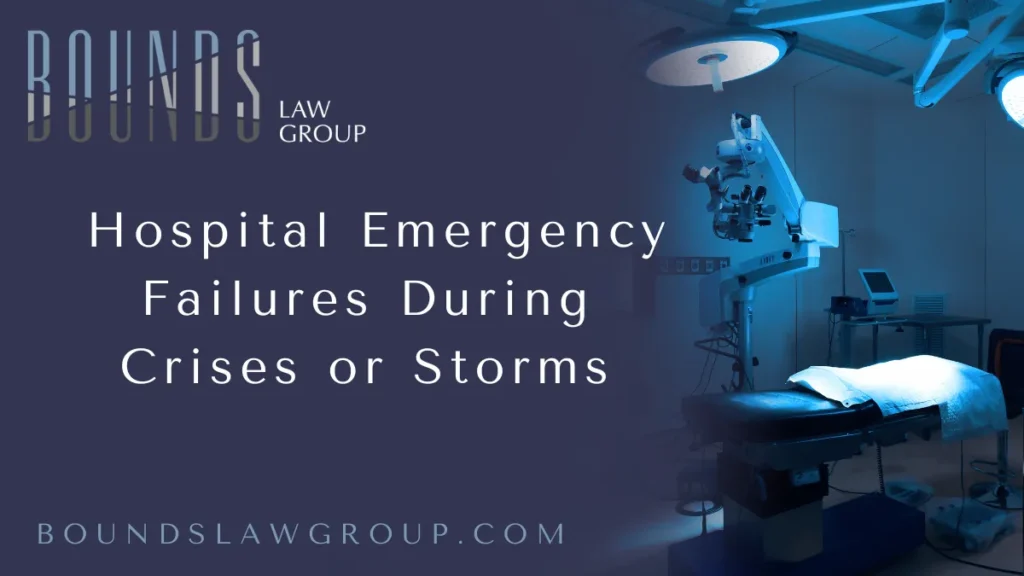
Orlando Hospital Emergency Response Malpractice
When a natural disaster strikes—whether it’s a hurricane, tornado, or other catastrophic weather event—hospitals in Orlando must be prepared to provide immediate, lifesaving care. Unfortunately, Orlando hospital emergency response malpractice has become a pressing concern. These failures during crises or storms can lead to devastating consequences for patients, families, and communities.
At Bounds Law Group, we represent victims of emergency care failures and hospital negligence during natural disasters. If you or a loved one has suffered due to a hospital’s lack of preparation or poor emergency response in Orlando, we urge you to complete our free case evaluation form and call us now at 877-644-5122.
What Constitutes Orlando Hospital Emergency Response Malpractice?
Orlando hospital emergency response malpractice refers to any negligent, careless, or reckless actions by hospital staff or administration during a state of emergency or severe weather event. These failures often involve:
- Inadequate disaster preparedness plans
- Delayed or refused treatment during a storm
- Lack of critical supplies or medical personnel
- Improper triage and patient prioritization
- Failure to evacuate or shelter-in-place safely
Hospitals are required to follow strict federal and state guidelines for disaster readiness. Failure to meet these obligations, especially during high-risk weather events, is not just negligent—it is malpractice.

Common Scenarios of Emergency Failures in Orlando Hospitals
1. Power Outages Without Backup Support
Hurricanes frequently knock out power across Florida. Hospitals must have functional generators and redundant energy systems. If an Orlando hospital loses power and lacks operational backups, critically ill patients—especially those on ventilators or in ICUs—can suffer fatal consequences. This is a clear example of Orlando hospital emergency response malpractice.
2. Failure to Evacuate or Protect Vulnerable Patients
Hospitals in flood-prone zones or coastal areas must have effective evacuation protocols. When hospital administrators fail to move high-risk patients in time or protect them from floodwaters, it often leads to preventable deaths or permanent injuries.
3. Communication Breakdowns
Patients in crisis rely on timely, accurate information. A breakdown in communication between emergency departments, EMS personnel, and public officials can result in serious delays or misdirected care. This systemic failure is often rooted in poor planning and understaffed departments.
The Legal Standard for Hospital Emergency Malpractice
To hold a hospital liable for Orlando hospital emergency response malpractice, we must prove:
- Duty of Care – The hospital owed the patient a legal duty.
- Breach of Duty – The hospital failed to act reasonably during the emergency.
- Causation – This failure directly caused harm or death.
- Damages – The patient or their family suffered measurable loss.
At Bounds Law Group, we have a deep understanding of how to litigate emergency response failures. We use internal hospital logs, staff testimony, state inspection reports, and FEMA guidelines to build airtight cases.
Case Study: Hospital Negligence During Hurricane Irma
During Hurricane Irma, several Florida hospitals were found to have violated emergency protocols. In one notable instance, elderly residents in a care facility died due to overheating when the air conditioning failed. The lack of immediate evacuation was cited as the cause. Though not in Orlando, this case sets a critical precedent: hospitals and healthcare facilities must act proactively—not reactively.
These same lapses can—and have—occurred in Orlando hospitals. Emergency response isn’t just about managing chaos; it’s about executing well-rehearsed plans designed to save lives. If your loved one suffered during a storm because a hospital failed to do its job, that’s not a tragic accident—it may be malpractice.
Storm Preparedness Requirements for Orlando Hospitals
Florida law, FEMA regulations, and The Joint Commission all set forth specific guidelines for hospitals to follow during emergencies:
- 72-hour self-sufficiency: Hospitals must be able to operate for at least 72 hours without external support.
- Evacuation plans: Must include transportation, triage, and patient tracking.
- Surge capacity: Ability to handle a sudden influx of patients.
- Staffing protocols: Emergency staffing must be coordinated and documented.
- Communication drills: Staff must be trained on internal and external communication channels.
When hospitals fail to implement or follow these protocols, it’s not just poor management—it’s potential Orlando hospital emergency response malpractice.
How We Hold Hospitals Accountable
At Bounds Law Group, we conduct thorough investigations into emergency response failures, including:
- Reviewing compliance with the hospital’s Emergency Operations Plan (EOP)
- Obtaining surveillance footage and internal communications
- Interviewing medical staff and whistleblowers
- Consulting with hospital administration experts
- Analyzing timeline discrepancies in patient care
We leave no stone unturned because we believe no family should suffer due to a preventable breakdown in emergency care.
Damages You May Recover in a Hospital Emergency Malpractice Claim
If a hospital’s negligent storm response caused injury or death, you may be entitled to:
- Medical expenses
- Rehabilitation costs
- Loss of income
- Pain and suffering
- Wrongful death damages
- Punitive damages (in egregious cases)
The law allows victims to pursue accountability and compensation. But time is of the essence. Florida law imposes strict deadlines on medical malpractice claims. The sooner you act, the better your chances of recovering what you deserve.
Whistleblower Reports and Internal Failures in Emergency Response
In many cases of Orlando hospital emergency response malpractice, the most revealing information comes not from public reports, but from internal whistleblowers—nurses, doctors, and administrative staff who witness breakdowns in protocol firsthand. These individuals often raise red flags about systemic problems that place patients at risk during hurricanes or other crises, such as:
- Refusal to activate emergency protocols early enough
- Untrained staff assigned to critical care roles
- Suppression of internal complaints or concerns about preparedness
- Falsification of emergency preparedness logs or compliance reports
When hospitals prioritize cost-cutting or public image over safety, it can create a culture of silence where employees are afraid to speak out. However, Bounds Law Group works closely with insiders who come forward to expose malpractice. Their testimonies are often pivotal in proving negligence and holding facilities accountable.
We protect the identities of whistleblowers and use legal mechanisms to obtain secure depositions, emails, and internal memos. If you are a hospital employee who witnessed negligent emergency practices—or if your loved one was harmed due to internal chaos masked from public view—your story could make a critical difference in the fight for justice.
If you've been affected by Orlando hospital emergency response malpractice, we encourage you to complete our free case evaluation form or call us now at 877-644-5122 to take the first step toward holding the right people accountable.

Why Choose Bounds Law Group
With decades of experience in high-stakes medical malpractice litigation, Bounds Law Group understands the complexity of hospital emergency cases. Our legal team combines legal precision with deep medical knowledge, empowering us to expose systemic failures that others might overlook.
We don’t back down from large hospital networks. We have the resources, expertise, and commitment to fight for justice on your behalf.
Don’t Wait—Act Now to Protect Your Rights
Storms will continue to strike Orlando. Hospitals must be held to the highest standards of care, especially when lives are on the line. If you or someone you love suffered due to a hospital’s emergency response failure, Bounds Law Group is ready to stand with you and demand accountability.
Sources
- Florida Agency for Health Care Administration (AHCA) – Offers insight into hospital licensing and emergency preparedness regulations in Florida.
https://ahca.myflorida.com - Federal Emergency Management Agency (FEMA) – Sets national standards for disaster response in healthcare facilities.
https://www.fema.gov - The Joint Commission – Emergency Management Standards – Accreditation body guidelines that hospitals must follow for emergency preparedness.
https://www.jointcommission.org

